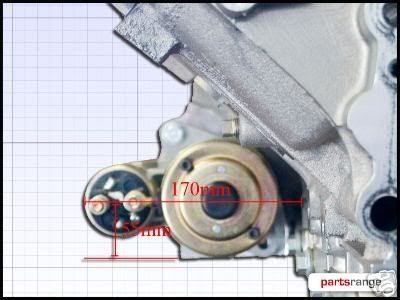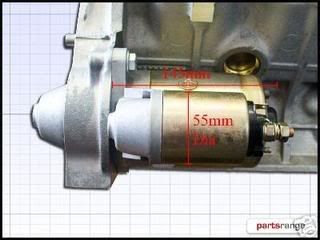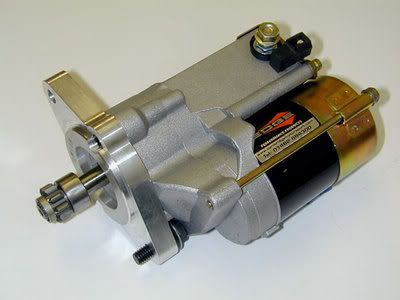You are using an out of date browser. It may not display this or other websites correctly.
You should upgrade or use an alternative browser.
You should upgrade or use an alternative browser.
hi torque starters
- Thread starter arthuy
- Start date
arthuy said:I was a little surprised it was in a different place, especially as I didn't notice until I had the Old one off !!!
But glad to say it was a great fit on the P5. The one they sell if this doesn't is double Price.
Hello,
Ah..a P5. You probably have a little more space between the engine and body/inner wing than the P6 and SD1 cars. Though I would've thought the swept-back manifolds might have been in the way on the P5. Yes, it would appear to be a Land/Range Rover OE starter, with the solenoid mounted on the side.


But as you say, the high torque starters are nearly double the price, so it looks like you've had a result with the LR type, as these can be bought - brand new - for about the same cost of reconditioning a Lucas unit. As the LR OE starters are produced by Bosch, Denso, Magneti Marelli, to name but a few... thus are much easier and cheaper to buy than the custom built High Torque type.

darth sidious said:That's quite disheartening to hear (well, read anyhow!)
I seem to recall that diesel engines need to be cranked over at a higher (300+) cranking rpm to get them to fire than is needed by petrol engines. Anyone able to confirm/deny this?
Hello,
I believe the "spins over faster" saying is actually correct as in the gearing is reduced for more torque, so the armature spins more easily and faster, but as the gearing is reduced there is a lot more torque provided at the pinion.
I'll repeat what I have been told on two occasions, one by a Rover / Land Rover / Range Rover parts specialist that has over been in business since the days of the P6. "Modern starter motors are not nearly as good as those fitted to the P6. Many from the 1980s onwards are just plane rubbish and will need replacing every few years" The second was by the Service Manager of a Range Rover business who said "Years ago starter motors would be sent away for repair, but these days it is easier and cheaper just to replace them. They don't last like they used to".
Ron.
Ron.
darth sidious
New Member
LeeEFi said:darth sidious said:That's quite disheartening to hear (well, read anyhow!)
I seem to recall that diesel engines need to be cranked over at a higher (300+) cranking rpm to get them to fire than is needed by petrol engines. Anyone able to confirm/deny this?
Hello,
I believe the "spins over faster" saying is actually correct as in the gearing is reduced for more torque, so the armature spins more easily and faster, but as the gearing is reduced there is a lot more torque provided at the pinion.
I realise the armature/rotor spins faster, but what I was meaning/asking doesn't the actual rotation speed of the crankshaft in a diesel have to be higher in order for it to start than with a petrol engine? i.e. doesn't a diesel starter have to not only provide more torque in order rotate a diesel crank, but also have to get that crank rotating at a faster rate than with a petrol engine, in order to cause sufficient combustion for it to start?
[/quote][/quote]darth sidious said:I realise the armature/rotor spins faster, but what I was meaning/asking doesn't the actual rotation speed of the crankshaft in a diesel have to be higher in order for it to start than with a petrol engine? i.e. doesn't a diesel starter have to not only provide more torque in order rotate a diesel crank, but also have to get that crank rotating at a faster rate than with a petrol engine, in order to cause sufficient combustion for it to start?
I would think the high torque starter motor is quite important on a diesel to rotate the engine with a high compression ratio, ie; 20.0:1 Comp Ratio. Also I think a conventional starter would probably wear the pinion/ring gear more quickly, and possibly overheat trying to rotate an engine with a high compression quickly.
darth sidious said:but also have to get that crank rotating at a faster rate than with a petrol engine, in order to cause sufficient combustion for it to start?
High torque, low speed, so I wouldn't have thought so?
webmaster
New Member
SydneyRoverP6B said:I'll repeat what I have been told on two occasions, one by a Rover / Land Rover / Range Rover parts specialist that has over been in business since the days of the P6. "Modern starter motors are not nearly as good as those fitted to the P6. Many from the 1980s onwards are just plane rubbish and will need replacing every few years" The second was by the Service Manager of a Range Rover business who said "Years ago starter motors would be sent away for repair, but these days it is easier and cheaper just to replace them. They don't last like they used to".
Ron.
Funnily enough I was discussing this with Pete the other day, and I realised that the starter in my 820 has so far lasted 22 years and over 200,000 miles. Not bad for a dodgy 80's starter ! In fact so has the alternator.
Funnily enough I was discussing this with Pete the other day, and I realised that the starter in my 820 has so far lasted 22 years and over 200,000 miles. Not bad for a dodgy 80's starter ! In fact so has the alternator.
I hope you were touching some form of wood when you typed that!
I am still using the original 1974 Lucas starter motor (which has never been apart) and my 1973 (date stamped) ignition coil, both with 252,000 Miles of use. I am typing very quietly so as not to let them hear....
Ron.
Ron.
darth sidious
New Member
LeeEFi said:darth sidious said:but also have to get that crank rotating at a faster rate than with a petrol engine, in order to cause sufficient combustion for it to start?
High torque, low speed, so I wouldn't have thought so?
Hmm, I'll have to ask around!
darth sidious
New Member
LeeEFi said:darth sidious said:I realise the armature/rotor spins faster, but what I was meaning/asking doesn't the actual rotation speed of the crankshaft in a diesel have to be higher in order for it to start than with a petrol engine? i.e. doesn't a diesel starter have to not only provide more torque in order rotate a diesel crank, but also have to get that crank rotating at a faster rate than with a petrol engine, in order to cause sufficient combustion for it to start?
I would think the high torque starter motor is quite important on a diesel to rotate the engine with a high compression ratio, ie; 20.0:1 Comp Ratio. Also I think a conventional starter would probably wear the pinion/ring gear more quickly, and possibly overheat trying to rotate an engine with a high compression quickly.
Definitely! A normal petrol starter will just probably end up getting toasted like a teacake!

